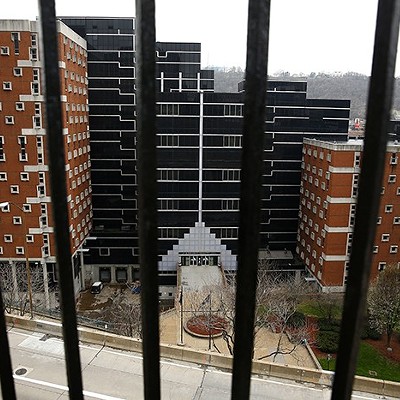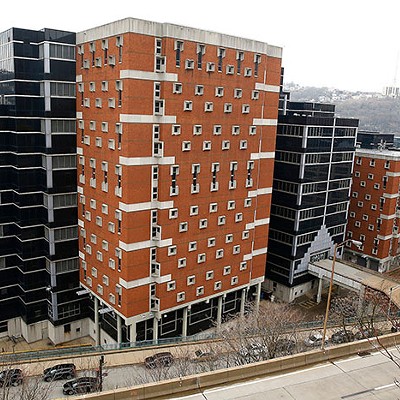Wednesday, March 18, 2015
Q&A with Pittsburgh City Council District 5 Candidate Kimberly Kaplan
Kimberly Kaplan, of Squirrel Hill, will challenge incumbent Corey O'Connor in Pittsburgh's City Council District 5 Democratic Primary. The Israeli-born, Pittsburgh-raised (specifically, raised in Greenfield and Sharpsburg) Chatham graduate traveled for a brief time after her completing her undergrad work to get a closer look at politics around the world, including trips to South Korea and Israel. Kaplan returned to Pittsburgh to pursue a graduate degree in International Relations and Conflict Resolution from the American Public University online program. She says she chose the university system because she liked its mission — educating returning vets — and she wanted to put her money there, even though she's doesn't fit that category. She says she became more involved in local politics in Squirrel Hill and other activism surrounding the Clean Water Act and pollution. With three classes left to finish, and a planned graduation date in November, she's campaigning nonetheless and wants to enact changes "that reflect what the neighborhoods [in District 5] need." Kaplan spoke to CP on Tuesday afternoon:
What made you want to run for Pittsburgh City Council?
It was a combination of things. I knew from a young age that I wanted to do something big for the community. At age 10, I thought I could do that through writing. I was inspired by the civil-rights movement. But, because I was good in math and science, my parents encouraged me to focus on that for college. I got my undergrad at Chatham in mathematics, mostly concentrating on physics. But, at Chatham, a lot of the core classes were geared toward a global focus and political issues. My senior year, I took a class on the Israeli-Palestinian conflict, and that hit close to home for me. ... [After traveling abroad] and around the U.S. in 2012, I returned to Pittsburgh because I missed it and started my graduate degree. ... I started getting involved in my local politics in Squirrel Hill. I got interested in seeing what my city-council member was doing, and I personally felt like it wasn't enough. ... So I decided to play around with the idea of running. And after attending Ready to Run [events] at Chatham, [I] decided to run.
One of my main goals for running is, ultimately, I would like to make some changes that would reflect what the neighborhoods need. Whether I win or lose, at least those issues will be brought to public light, and whoever wins, they’ll have to address them. Although ideally I’d like it to be me.
I noticed your campaign team is very young and may not have worked on campaigns before. Is that by design?
Not only do I want the policies that I’m bringing to the table to be inclusive of residents, but I want the actual political campaign to make a statement. The No. 1 focus of my campaign is to inform the public and encourage active participation in the political process, and the same goes for the statement I’m making with my team. From what I’ve gathered as I’ve become more involved in Pittsburgh politics ... there is a strong wait-your-turn system in place. And I don’t agree with it, which is why I’m bringing new people on my team who deserve a chance to show what they’re capable of.
What are the issues that reflect what the neighborhoods need?
I noticed that city council used to not be districted, and they changed that so that neighborhoods would be represented. But city-council members get very territorial and focus just on their areas rather than the whole city, and I don't think that's a very constructive way to run a city. My policies are separated into two sections, citywide and District 5 neighborhoods.
What would your citywide policies be?
[First] education, specifically I wanted to work with our school districts that have less funding and local universities and find ways to incentivize university students to provide tutoring to some of these schools, specifically to high school students studying for SATs. This also goes for the arts, I know a lot of the schools’ arts budgets were cut during Corbett’s time, and I would like to encourage and engage community leaders in the arts to volunteer their time for after-school programs introducing younger kids to the arts.
For transportation, I know potholes are such a huge issue in the city. One of the biggest problems we have is that we tend to use cheaper materials to repair them. Those materials break down faster, and it becomes an endless cycle. So when we’re repairing roads, we need to do it right the first time.
Also, I know there were bus cuts, and that it’s not specifically a city[-government] responsibility, but I’d like to work with Port Authority to find more funding whether throughout the budget or grants to re-expand the bus lines. There are a lot of people who can’t access grocery stores or even get to their jobs. A lot of residents in [District 5] neighborhoods, specifically, don’t have access to a vehicle or they share it with a number of people.
And, I know we’ve been focusing on making our roads more pedestrian- and bike-friendly, and I’d like to continue that but also make sure our bike routes are where our bikers are and not being placed where there’s simply an inconvenience to our drivers. I’ve heard a lot of complaints about that from both drivers and bikers alike.
For job creation, a lot of people in my neighborhood and in other areas in Pittsburgh deal with not just unemployment but underemployment. So there’s two strategies I want to focus on to alleviate some of this stress for residents. The first is to be able to provide incentives for locals to start needed businesses for their areas. Although I’d like to see larger businesses move in, for example into the Almono site in Hazelwood, I don’t think that we should put all our eggs in that basket.
And the other strategy is to expand child-care services. One of the obstacles I hear for parents being able to function in their job life is that they don’t have a place for their kids to go, and they have to keep calling off and that causes them to get fired or not make ends meet.
What are your plans for neighborhood-specific policies?
Very generally, a lot of the attention from city council in my neighborhoods has been focused on beautification, which includes tree-planting, rebuilding signs and renovating playgrounds. I think these are all great things, but I think what our residents in District 5 really need right now is security, and that goes for job, housing, food, educational and physical security. Crime is a big issue in some of my neighborhoods. Some of the specific things would be, for example, for housing security, I hear a lot of issues with new residents purchasing new houses and purchasing them at a higher property-tax rates, and then for some reason the city expands that higher tax rate to the neighbors, and that can put a lot of financial pressure on people who live there. If I were on city council, I would want to introduce legislation that allows the property-tax rates to be based on individual residences, not necessarily a street or a neighborhood. For food security, a lot of people in some of the underserved District 5 neighborhoods like Glen Hazel, Hazelwood and Hays don’t have access to grocery stores, let alone fresh organic food. They have access to gas stations or 7/11, but it’s not necessarily healthy food, or food sustainable enough for raising children. I’d like to make sure they have access to those closer to home or transportation to them.
As for education, and this is something I’d have to work with Pittsburgh Public Schools on, but a lot of schools have closed down, and I keep hearing from residents that their kids have to be bused to Minadeo Elementary or Taylor Alderdice, depending on the age of the child and the neighborhood they live in. I think that those are fine educational institutions, but I think that the children would benefit from shorter commute times and a better student-to-teacher ratio. So, I’d like to work with PPS and look into grants and other possible state and federal funding opportunities to re-open some local schools.
Lastly, physical security. There’s been issues with our police force, and some brutality, but in addition to that, there’s crime happening. One way to avoid unnecessary violence and to provide comfort to residents and police officers is to create events and programs to provide an introduction between police and residents so they can get to know one another. When the residents know their police officers, they can be more trusting of them, and when the police officers know their residents, they know when an outsider is coming in and causing trouble. And I think that will help avoid a lot of misunderstandings and miscommunication between our citizens and our officers.
What tools would you use to implement these strategies?
Obviously at this point, I don’t have all of the contacts that I need, but with my background in conflict resolution, I’ve done a lot of research on how to work with local and regional groups and organizations and key individuals to resolve problems, and that’s the strategy I plan to take for this. I know in the past the strategy for [District 5] neighborhoods from the city is to kind of throw money to an outside organization to come in and fix the problem. I think when that happens, we inefficiently use our funds and the problem remains.
I do have contacts with community leaders, organizations, local churches, and I’ve made some contacts with Pittsburgh city groups that want to help the city as a whole. I’ve already started trying to bring some of these groups together to benefit the communities in an inexpensive way, while engaging the residents to play an active role in their communities. I generally think that when the residents feel like they’re actually able to do something for their community, they want to take care of it, and then the community thrives.
One of my No. 1 concern in running this campaign is not about trying to win. That’s actually not my No. 1 goal. My No. 1 goal is to inform the public about the political process about their options, about the way their government works, and two, to try to encourage people to become active participants in that process, to try to show them that their concerns can be met with the proper representation, their voices matter. I know a lot of my neighborhoods are less politically inclined and don’t vote because they’ve been largely ignored, and because they don’t vote, representatives don’t ask them about their issues, and it becomes a cycle, and I’m trying to break that.
But if you do win, do you feel confident in your ability to do the job?
Yes, I've looked into the incumbent's legislative record. I consider anything else he does — attending community events, thanking volunteers for working on things he didn't organize, informing the public about events — as being a good community member. It seems that people have very low standards for politicians in general. We need to raise the standard.
So are you saying that he needs to step up his legislative offerings?
Not in quantity, but in quality, but I don’t want to really make the focus about his faults but would rather focus on what we can do.
Are there particular pieces of legislation that you're referring to?
One of the first things he did when he was in office in March of 2012 is that he moved $4,000 from various public-works project funds and to the Penn State Center – Pittsburgh, and this was for tree plantings in ... Four Mile Run. This to me is an example of bringing in an outside organization to do something that I think residents could have been part of, especially those who are underemployed. It would have been a great way to engage in their local parks as well as making money on the side.
I do want to add that, I’m not privy to all the info that went into negotiations of this, so I can’t say for sure. But I would have liked to see more effort to incorporate residents, like I said.
Again I don’t want to attack every single piece of legislation. That being one of the first things he did, that to me is indicative of the rest of his legislative record. But if anyone is interested, I have that in a brief summary of his legislation that I’m making available to people as I campaign. That excludes proclamations and wills of council. I don’t include these in my summary that I’m giving to people. Of course, it’s all public information, but it can be difficult to navigate the Legistar system [the online system for searching municipal legislation].
What has he done that you have admired?
In April 2012, he called for an ordinance to establish a Pittsburgh HIV/ AIDS commission. Health issues are one of my big concerns, especially with older residents, and I’d like to see more commissions on that in the future.
Tags: Election 2015. Pittsburgh City Council , District 5 , Kimberly Kaplan , Corey O'Connor , Image
















